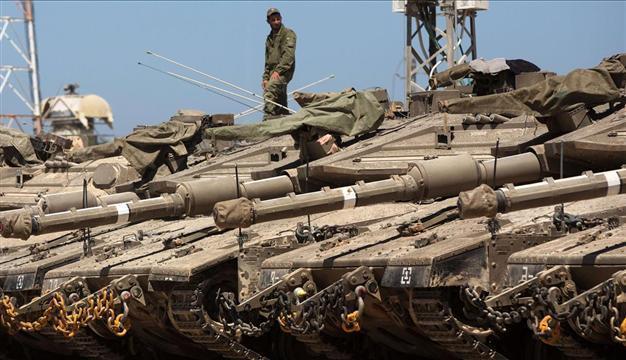Turkish President Gül warns Israel against Gaza ground operation
ANKARA

Israeli soldiers stand on Merkava tanks in an army deployment area near Israel's border with the Gaza Strip, July 11. AFP Photo
President Abdullah Gül has warned Israel not to carry out a ground assault on Gaza Strip, calling the country to stop its air strikes on civilians as political parties across the spectrum continue to react against the deadly raids.In a written statement on July 11, President Gül said parties should return to the terms of cease-fire in 2012 and efforts should be exerted to resume peace talks in a way to render “indispensable rights to Palestinian people.” Later in the day, speaking to reporters after Friday prayers in Ankara, Gül warned Israel of “planting seeds of hate” if it continues the military operations.
“Israel, as though exploiting, is bombing Palestine from sea and land, destroying houses and killing innocent people in front of the world’s eyes,” President Gül said, labeling the acts of Israel as “dangerous.”
“I’d like to remind that these attacks [of Israel] will plant seeds of hate,” he stated.
The president called on the international community, primarily United Nations, for close cooperation and consultation, adding that the escalation of tensions could lead to “everlasting grand chaos.”
Separately, Prime Minister Recep Tayyip Erdoğan, the main opposition Republican People’s Party (CHP) and presidential candidate Selahattin Demirtaş slammed the Israeli actions.
“You will first stop this oppression. If not, it is not possible to realize normalization between Turkey and Israel,” Erdoğan said on July 10 in the Central Anatolian province of Yozgat after a fast-breaking iftar meal.
Relations between once-regional allies Israel and Turkey hit an all-time low when 10 Turkish activists died in a 2010 maritime assault by Israeli commandos on Gaza-bound ship Mavi Marmara in international waters. The Israeli assault provoked a sharp response from Ankara, which expelled the Israeli ambassador, demanded a formal apology, compensation for the victims, and an end to the blockade on Gaza.
Israel and Turkey have been locked in talks for more than a year over compensation, after the former extended a formal apology to Ankara in a breakthrough brokered by U.S. President Barack Obama. Erdoğan said that Turkey’s first two conditions, apology and compensation, appeared to have been fulfilled. But he said deadly raids on Gaza showed that Israel had no intention of complying with Ankara’s third condition: To end the blockade on the Palestinian enclave.
“Then how can we normalize (ties) with you?” asked the premier.
Erdoğan also lashed out at Israel’s “disproportionate use of force against innocent” Palestinians, calling on the world and the U.N. to stop the assault.
Opposition slam operation
Republican People’s Party (CHP) deputy chair Faruk Loğoğlu has said his party unconditionally denounces “Israeli actions against innocent civilians, primarily women and children.”
The CHP finds Israel’s “frequently conducted way of collective punishment, which involves innocent people, against the law and humanity,” Loğoğlu said in a written statement on July 11.
Collective punishment deterrent from peace would only serve for a new wave of violence in the region, he said.
One should not allow the continuation of the spiral of violence and even deepen it with a military ground operation, Loğoğlu said, noting his party agrees with the U.N. Secretary General Ban-Ki Moon’s call for restraint.
The Peoples’ Democratic Party’s (HDP) Selahattin Demirtaş said condemnation and asking Israel to stop the attacks were not enough.
“Turkey, a country which asserts to being a regional actor, has no influence on the issue of Palestine-Israel and that is pathetic at a time when Israel is using oppression,” Demirtaş told reporters July 11.
None of the statements made by Turkish leaders has cogency or influence, he added.
Spiral of violence
Meanwhile, Gül, in his written statement, warned about recent “spiral of violence” in the world, referring to Iraq, Ukraine, Libya, Syria, Afghanistan, Yemen, and Somalia. “Violence, terror and armed clashes pose a great risk to peace and stability in the world. And this escalation leads to irrecoverable humanitarian tragedies,” he said.
Elaborating on developments in the Middle East, Gül said, “I invite all parties to end conflicts and to act with responsibility. I invite all of them to urgently activate diplomacy and dialogue channels, with all their sincerity. Otherwise, no winner will appear out of all this process.” He also urged for the immediate release of the Turkish consulate staff who have been held captive in Iraq since militants abducted them in June 11.
















